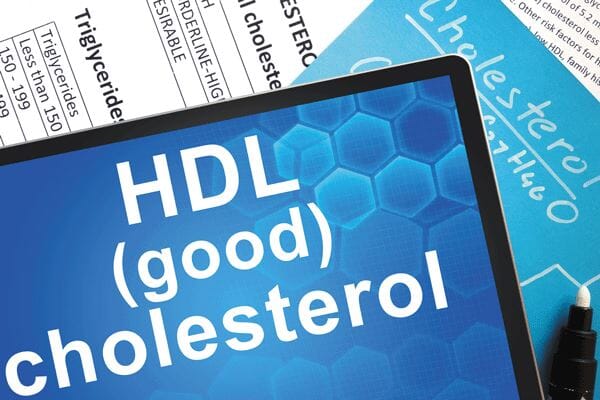
HDL Cholesterol
Time to read 6 min
Time to read 6 min
HDL cholesterol or High density lipoprotein cholesterol is a vital health biomarker for overall longevity and wellbeing. It is important to check the HDL cholesterol normal range so that you're able to track any heart health risk through blood testing.
HDL cholesterol helps in carrying the cholesterol from various parts of the body to the liver for removal. That's why it is important to maintain normal to higher levels of HDL cholesterol so that your body is able to remove the cholesterol efficiently.
Your cardiovascular functioning and your overall health can be impacted if your HDL cholesterol levels aren't within the normal range. HDL cholesterol in your blood can also be tracked over time to determine whether you are at risk of stroke, heart disease, blood pressure issues, etc. It is important to track HDL cholesterol and the CHOL HDL ratio to ensure optimal health.
Spherical particles called lipoproteins help carry cholesterol and other fats through the bloodstream for hormone production, immune health, metabolic health, and cell membrane production. The two most common types of lipoproteins are LDL (low-density lipoproteins) and HDL (high-density lipoproteins).
HDL cholesterol is often referred to as the good cholesterol and is generally a marker for how effective your body is in removing cholesterol from your bloodstream. Higher levels of HDL cholesterol can indicate healthy heart functioning and effective overall cardiovascular activity.
Normal HDL levels are important to maintain to promote health and wellbeing. It is also important to check how to increase HDL cholesterol so that you're able to manage your health better and avoid any potential risk areas.
Desirable - 60 mg/dL (1.6 mmol/L) or more
At-risk - Less than 40 mg/dL
Desirable - 60 mg/dL (1.6 mmol/L) or more
At-risk - Less than 50 mg/dL
It is important to note that HDL levels 100 mg dl or higher can be in extreme levels, requiring medication or treatment. It is also important to measure your low density lipoprotein as well as your high density lipoprotein HDL level of cholesterol together for a complete health analysis.
Higher levels of HDL cholesterol are generally seen as a positive health aspect as your body is able to remove the cholesterol from your bloodstream, which can reduce the risk of overall cardiovascular issues. It is also important to check for extremely high levels of HDL cholesterol, which can impact your health overall as well. Levels that are higher than 100 mg/dL can create risk factors within heart health.
Lower levels of HDL can mean that your body is unable to remove cholesterol effectively from your blood stream, which can impact your overall cardiovascular health and wellbeing. You can focus on your diet, exercise, genetics, and lifestyle factors to improve your HDL cholesterol to normal levels.
It is essential to measure your non HDL cholesterol as well to understand the complete analysis of your overall health. You should also check the HDL normal range for your age and gender categories, so that you're able to maintain these levels. The LDL HDL cholesterol ratio is also important to track.
While there are no direct symptoms of non-normal HDL cholesterol, you can start to experience the common effects of poor cardiovascular health. You can also experience these symptoms at different intervals, making it harder to predict whether your HDL cholesterol is at healthier levels.
You can experience pain in the chest region that is not related to any other condition or issues with gas pains or other types of pain. You can get an ECG done to check your heart health and understand whether there are any complications present.
You can experience tiredness and fatigue and issues with low overall energy levels. These can also be due to a poor diet and overall focus on health, but can be connected to issues with HDL cholesterol or other cardiovascular issues.
You may have issues or difficulty breathing when there is an issue with HDL or LDL cholesterol. You should check the report for your HDL cholesterol meaning so that you can track how to increase HDL cholesterol if the levels aren't within the optimal range.
If your levels aren't within the HDL normal value range, then you can have issues with a rapid heartbeat. You should check the HDL and LDL biomarkers so that you're aware of the LDL HDL ratio and whether your HDL cholesterol low levels can be detected.
You may experience some issues with light-headedness, confusion, and headaches, if your HDL cholesterol is out of range. You can also experience other symptoms such as difficulty breathing, along with the headaches.
You should get your HDL cholesterol levels checked every 6-12 months if you have a prior history of issues with cholesterol management. You can test more regularly if you are making the right changes or are on medication for managing HDL cholesterol levels. Your risk of heart disease can also be tracked through understanding high or low HDL cholesterol levels.
There are several strategies to improve your HDL cholesterol levels if they are below the normal levels. Your cholesterol is a key factor in optimizing your overall health, as it can impact various functions throughout the body. You can focus on these factors to improve your LDL HDL ratio.
Your diet should consist of healthy options that include a range of fruits, vegetables, and grains. You can also reduce your consumption of fried foods and overly processed foods that can cause issues with HDL or LDL cholesterol.
You can cut out smoking and drinking, as well as unhealthy food options, to improve your overall lifestyle. You can also focus on stress management and stress relief techniques, as high stress situations and scenarios can impact your normal HDL levels.
You should focus on a range of healthy fat options that can improve your HDL levels. You can add avocados, coconuts, olive oil, seeds & nuts, that can help in improving your overall cholesterol processing. Your body can utilize the healthy fats better as well to help balance your hormones and improve your other biomarkers.
You can improve your activity levels over time, allowing your body to naturally process the cholesterol present in the body. By increasing activity, you can also benefit from a lower cholesterol HDL ratio, as activities can improve your overall cardiovascular health long-term.
To a certain extent HDL levels can have a genetic component to them, especially if you have a family history of cholesterol related issues. You can still take the right precautions and improve your diet to boost HDL cholesterol levels.
Dietary fats can impact HDL levels to a certain extent. Your lifestyle and activity levels can also be a contributing factor to low HDL levels. You can focus on a range of healthy fat options such as fish, nuts, olive oil, avocados, etc. to improve your HDL cholesterol levels. You should also check the HDL cholesterol meaning of your report regularly to understand your interventions success.
Certain medications, like statins, fibrates, and niacin, can influence HDL levels. These may have an impact on the HDL normal range or LDL HDL ratio, which can affect the HDL cholesterol levels. You should always consult your doctor prior to changing medication.
You can naturally increase lower HDL levels by opting for beans, legumes, whole grains, leafy greens, and vegetables. These can be made into sabzis, daals, vegetable mixes, and other dishes made in the Indian style. You can also check your LDL HDL cholesterol ratio when you're checking how to increase HDL.
* * Medical Disclaimer - The following information is for educational purposes only. No information provided on this website, including text, graphic, and images, are intended as substitutes for professional medical advice. Please consult with your doctor about specific medical advice pertaining to your condition(s).


